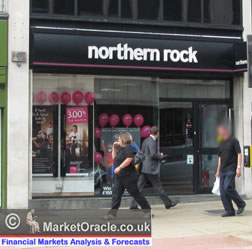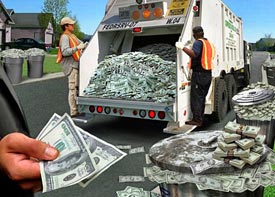True Cost of This Global Banking Crisis
Stock-Markets / Credit Crisis 2008 Mar 12, 2008 - 06:05 PM GMTBy: Adrian_Ash
 "...If only the big central banks would sit on their hands and let this crisis work out, they could save Western taxpayers up to 98% of the potential mopping-up costs..."
"...If only the big central banks would sit on their hands and let this crisis work out, they could save Western taxpayers up to 98% of the potential mopping-up costs..."
HOW TO KEEP YOUR HEAD when all about you are losing theirs?
"Steer clear of the new gold rush," urges Jason Zweig, a senior columnist at Money Magazine .
"Don't give in," says Janice Revell, another senior hack at CNN's glossy monthly. "Step out of the stock market, even temporarily, and you may miss the whole point of owning stocks."
"Aw, just lend! Lend! LEND!" screams the Federal Reserve. Sporting its usual crystal-meth grimace, it's stumping up $200 billion in Treasury bills for desperate New York brokers to kick-start the world's capital markets. And now they can use flakey mortgage-backed bonds as collateral.
Stepping in "to address liquidity pressures" like this – and getting your chums at all the other top central banks to do the same – looks the next-best thing to buying mortgage-backed bonds altogether. But while central banks don't surely want to become "home buyer of last resort", it's got to be better than doing nothing. Right?
Acting early and often must work out cheaper in the end. Mustn't it?
Well you'll never guess what. As anyone who ever fell for interest-free vendor financing knows only too well, the cheapest option – always and everywhere – is to avoid spending any money at all.
As a professional economist would put it, "we find no evidence that accommodating policies reduce fiscal costs." That's how two senior economists at the World Bank put it in a 2002 report studying 30 years of systemic banking crises across 94 countries.
Borderline crises hit 44 nations. And on average, the World Bank economists found, "governments spent an average of nearly 13% of GDP cleaning up their financial systems" as a result of the bail-out programs they tried to implement.
"Indeed, each of the accommodating measures examined," they continued – citing "open-ended liquidity support, blanket deposit guarantees, regulatory forbearance, repeated (and thus initially inadequate or partial) recapitalizations, and debtor bail-out schemes – appears to significantly increase the costs of banking crises."
Weird like pineapple on pizza, don't you think? Because the seven central banks jumping to hit the "panic button" this week are all members of the World Bank. They actually helped found it back in 1944. More than that, the central banks led by Ben Bernanke, Jean-Claude Trichet, Mervyn King and the rest all figure in this 2002 report.
All except the Swiss National Bank, that is...
#1 S&L U.S.A: The slow-motion savings & loan collapse in the United States destroyed some 1,400 institutions and took another 1,300 banks with it between 1984 and 1991. Direct cost to the US taxpayer? Some $180 billion, or 3% of annual economic output.
#2 Europe 's Bad Banks: Staff at the European Central Bank might like to recall the Greek and Italian bail-outs of the early 1990s...or the $10 billion failure of France 's Credit Lyonnais in 1995...or Germany 's giro-bank crisis in the mid-70s?
#3 Japan 's Lost Decade: The 1996 rescue of Japan 's zombie banks cost more than $100 billion in public funds. Two years later, the Obuchi Plan spent another $500bn of taxpayers' money – some 12% of Japan 's GDP – on loan losses, bank recapitalizations and depositor protection.
#4 The UK's Repeat Failures: From the "second line" crisis of the mid-1970s to the collapse of Johnson Matthey in 1984, BCCI in 1991, Barings in 1995 and now Northern Rock in 2007, the UK authorities have repeatedly failed to spot trouble before wading in with taxpayers' cash.
#5 Canada , 1985: The Bank of Canada itself notes how the failure of 15 members of the Deposit Insurance Corporation – including two banks – accounted for less than 1% of the total banking system. Yet it led to long-term liquidity loans, funded by the public, plus 15 years of expensive court wrangling.
# 6 Sweden 's Systemic Crisis: In the early 1990s, two banks accounting for one-fifth of all Swedish banking assets were declared insolvent. By 1994, five of the six largest banks faced serious problems, costing taxpayers 4% of GDP in government support.
Don't the current heads of the world's biggest central banks ever flick through World Bank research reports while waiting to get their teeth straightened or beards trimmed...?
" Managing the Real & Fiscal Costs of Banking Crises " might even turn up after a quick Google search by junior staffers at the Federal Reserve, ECB or Bank of England.
Hell, we managed to find it easy enough here at BullionVault ...
But given the current collapse of real estate markets, banking models, hedge fund credit lines and short-term liquidity the world over since last August – back when Gold Bullion traded one-third below today's current price – who in their right mind would bother to read a study of 113 truly system-wide banking crises in 93 countries between 1970 and the year 2000...?
No one running monetary or fiscal policy in the G7 group of top economies, that's for sure!
"If the countries in our sample had not pursued any such [supportive or bail-out] policies, fiscal costs [borne in the end by the tax payer] would have averaged about 1% of GDP – little more than one-tenth of what was actually spent," write Patrick Honohan and Daniela Klingebiel in their report, published in Jan. 2002.
What's more, trying to bail out or support failing banks did nothing to reduce the economic drag that followed, according to Honohan and Klingebiel's analysis. The so-called "output dip" never responded to government meddling – not unless the central bank stepped in to ease liquidity problems at crisis-hit banks with unlimited cheap loans.
 That kind of support – exactly the support given to Northern Rock as it went belly-up in Sept. last year – is only one step removed from the market-wide support now being offered to New York brokers today. Yet it "actually appears to have prolonged crises," write the two World Bank bean-counters, "because recovery took longer" following liquidity loans to effectively insolvent banks.
That kind of support – exactly the support given to Northern Rock as it went belly-up in Sept. last year – is only one step removed from the market-wide support now being offered to New York brokers today. Yet it "actually appears to have prolonged crises," write the two World Bank bean-counters, "because recovery took longer" following liquidity loans to effectively insolvent banks.
In other words, the only sure way of prolonging a financial crisis is to try and delay it. Say, by putting tax-payers "on risk" with $200 billion in mortgage-backed loans.
"Things could have been worse," the World Bank goes on. If every country hit by a systemic banking crisis during the 30 years to 2000 had piled in with liquidity support (like the G7 central banks are offering today) or blanket depositor guarantees (as the UK government did with Northern Rock), the final bill of trying to clear up the mess early would have risen sharply.
Throw in regulatory forbearance – letting "zombie" banks continue their operations, even though they're technically bust – plus repeated recapitalizations and debtor bail-outs, and "fiscal costs would have reached more than 60% of GDP."
Nasty rumors keep whacking "living dead" bank stocks in the City, Tokyo, Frankfurt, La Defense and on Wall Street right now. And so far, tax payers aren't on the hook for recapitalizations; UBS and Citigroup have gone to Asian and petro-wealth funds for that. Ben Bernanke has so far only demanded that subprime lenders write off the value of outstanding loans, rather than calling on Congress to issue the checks direct.
But if the authorities sat on their hands during this crisis, the fiscal cost might equal one per cent of GDP, the World Bank report suggests. Donning a cape, tights and mask instead – and pretending they can unwind the mal-investments caused by record low-interest rates from the Fed after the Tech Stock Bubble burst – the cost may rise 60 times over.
That's more than a 98% saving, if only the G7 authorities would sit back and let the failed banks fail.
Put these findings to one side, however. Because most remarkable about the World Bank study – other than the fact central bankers are so clearly ignoring it – is that anyone could ever imagine things differently.
 Throwing "good money after bad" is a moral hazard that everyone's grandma knows to avoid. And just like the truly historic bubble in credit that created it, the endgame for today's official response to this historic banking crisis looks as inevitable as it's sure to prove painful.
Throwing "good money after bad" is a moral hazard that everyone's grandma knows to avoid. And just like the truly historic bubble in credit that created it, the endgame for today's official response to this historic banking crisis looks as inevitable as it's sure to prove painful.
"Fiscal outlays are not the only economic costs of bank collapses," note Honohan and Klingebiel. "The losses covered [by tax-payers] – which are caused by bad loan decisions – reflect wasted investible resources. Furthermore, a government's assumption of large, unforeseen bailout costs can destabilize fiscal accounts, triggering high inflation and a currency collapse – costly in themselves – as well as adding to the deadweight cost of taxation."
High inflation and a currency collapse, you say? As a rule, smarter investors spotting this trouble in good time can switch into hard currency to hedge their domestic inflation risk.
But today's systemic banking crisis crosses all developed economies...from North America to Japan and Australia onto Europe and the United Kingdom . So unlike the Asian Crisis of 1997, you can't flee the Thai Baht by hedging with Dollars today. Nor can you flee the Hungarian Forint for the safety of French Francs or Deutschemarks as you could when 25% of Budapest 's banking assets were caught in a mass bank failure in 1993.
Where to go?
What to use as a hedge against all currency risk?
By Adrian Ash
BullionVault.com
Gold price chart, no delay | Free Report: 5 Myths of the Gold Market
City correspondent for The Daily Reckoning in London and a regular contributor to MoneyWeek magazine, Adrian Ash is the editor of Gold News and head of research at www.BullionVault.com , giving you direct access to investment gold, vaulted in Zurich , on $3 spreads and 0.8% dealing fees.
(c) BullionVault 2008
Please Note: This article is to inform your thinking, not lead it. Only you can decide the best place for your money, and any decision you make will put your money at risk. Information or data included here may have already been overtaken by events – and must be verified elsewhere – should you choose to act on it.
Adrian Ash Archive |
© 2005-2022 http://www.MarketOracle.co.uk - The Market Oracle is a FREE Daily Financial Markets Analysis & Forecasting online publication.



